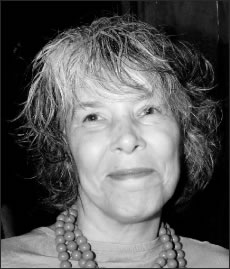By Julie Shapiro
Susan Duncan, assistant director of the Church Street School for Music and Art, died early Sunday morning in the hospital less than two weeks after being diagnosed with stomach cancer. She was 59.
Tribeca parents sounded shocked as word of Duncan’s death spread, because the teacher, artist and neighborhood figure appeared healthy earlier this year and worked at the school until the end of February.
“People are reeling,” said Miriam Wermelt, a Tribeca resident whose two young sons took classes at the Church Street School. “People very much cared about her.”
Duncan infused the school with her belief that any child, no matter how young, can be an artist. The classes she supervised were messy and creative, focusing on the process of making art, not the final product.
“Susan never looked at them as though they were just 2½ -year-olds,” said Anna Grossman, whose son had Duncan as a teacher. “She saw them as little human beings who weren’t forced to think inside the box.”
Lisa Ecklund-Flores, founder and director of the Church Street School, called Duncan’s death a devastating loss both personally and for the school.
“Our souls have been fused for nine years,” said Ecklund-Flores, who hired Duncan in 2000 and counted her as a close friend. “Every single thing I’ve done here in the last nine years I’ve done with her.”
An unofficial duty that fell to Duncan — perhaps because she was so good at it — was to comfort the 2 and 3-year-olds who were terrified of being separated from their parents for the first time. Wermelt said her children are usually skittish around strangers, but her son Benjamin took to Duncan immediately when she knelt beside him as he cried on the first day of class several years ago.
“She intuitively knew how to talk to kids,” Wermelt said. “She was someone who got down to their level.”
Ecklund-Flores remembers stopping by one of Duncan’s classes in the first week of Duncan’s first summer session, expecting to see at least one young child homesick and in tears. Instead, she found all the kids happily ripping up colored tissue paper and releasing it in front of a fan that blew a rainbow shower of confetti around the room. The children were spellbound, watching the tissue paper dance in the air.
“Nobody cared where their parents were, because they were so completely engaged,” Ecklund-Flores said. “She was a magician, in a way.”
Friends described Duncan as generous and irrepressibly positive. She focused her full attention on whomever she spoke to, making close friends and acquaintances alike feel cared for. She spoke with pride about her current students and always asked after former ones. Many students continued drawing her pictures after the classes finished, and some of those drawings hung in her hospital room this month.
Duncan was also an artist in her own right, who exhibited paintings and sculptures in Seattle, Arizona and New York. Duncan studied at the Art Institute of Seattle, the School of Visual Arts, and the Art Students League and worked as an illustrator, graphic designer, film animator and art director. Duncan switched to teaching after her son, now 16, was born, and worked at the Children’s Museum of the Arts in Soho before coming to the Church Street School.
Duncan was born in Seattle and grew up nearby. Her mother, Marilyn Mowry Duncan, still has some of her earliest art projects, mosaics and creations made from buttons and lampshades. Marilyn recalled her daughter’s hot temper growing up and said Duncan mellowed significantly when her son was born.
Duncan also developed a connection with children after her son’s birth that surprised her sister Christy Hutter, who remembered Duncan never wanting to baby-sit when they were in high school. Now, anyone who has ever watched Duncan work with children speaks of her unfailing patience with them.
Duncan met John Figurski, the man who would become her husband, after an Elvis Costello concert in New York in the late ’70s. She was there with someone else but gave Figurski her number anyway, scrawled on the back of a ticket stub. Figurski still remembers what Duncan was wearing: a blue-and-white-striped sailor’s shirt with white pants.
But, taken as he was with her, Figurski never called. He and Duncan did not see each other again until a snowy night 12 years later, when friends introduced them at a dance. They did not recognize each other but connected immediately and began dating, marrying two years later in 1991. It was only once they moved in together and were going through a box of old ticket stubs that they discovered they had met many years before.
Figurski described Duncan’s attitude toward life as similar to the instructions she gave her art students: The process is what counts.
“Be here and now — enjoy what you’re doing,” Figurski said. “This is what’s real.”
Figurski choked up as he spoke about raising his and Duncan’s 16-year-old son on his own.
“I was the bad cop and she was the good cop,” Figurski said. “She was always the loving and nurturing one. Now I’ve got to be both.”
Duncan is survived by her husband John and son Duncan Figurski, who live on the Upper West Side, her parents George Telfer Duncan and Marilyn Mowry Duncan, and sisters Sandra Duncan and Christy Hutter.
Duncan’s family held a private memorial for her on Wednesday and her husband and son will scatter her ashes in places where the family had good memories, like Montauk and Coney Island.
The Church Street School will hold a larger memorial open to the community in early May and the school has set up a fund for Duncan Figurski.
“This school is her home — she told me that over and over,” Ecklund-Flores said. “She is alive in these walls.”
Julie@DowntownExpress.com
































